-
oa Medical Uses and Health Benefits of Caffeine - A Study among the Students of Medical University in the United Arab Emirates
- Source: New Emirates Medical Journal, Volume 5, Issue 1, Jan 2024, E02506882295703
-
- 11 Jan 2025
- 05 Mar 2025
- 01 Jan 2024
Abstract
Caffeine, a stimulant for the central nervous system, is extensively consumed worldwide and can be found in various items such as coffee, tea, chocolate, and energy beverages. In addition to its stimulating properties, caffeine has been shown to provide numerous health advantages, including relief from migraines, treatment for neonatal apnea, and possible protective effects against neurodegenerative diseases and metabolic disorders. Despite its widespread use, the understanding of caffeine's therapeutic uses among healthcare professionals is still quite limited.
This study was conducted to measure the awareness and knowledge regarding the health impacts of caffeine among medical students and interns at RAKMHSU.
A cross-sectional study was carried out over six months (September 2023–April 2024) involving 190 participants selected through purposive sampling. Data were gathered using a structured, pretested questionnaire and analyzed with SPSS v29. Both descriptive and inferential statistical methods, including chi-square and independent t-tests, were employed.
The majority (70.5%) of the participants were female, with an average age of 20.52 years. Although 67.4% acknowledged caffeine's efficacy in migraine management, awareness of its neuroprotective properties (Parkinson's: 22.6%; Alzheimer's: 28.4%) and metabolic advantages was notably low. Students in clinical years exhibited significantly higher knowledge scores compared to their preclinical peers (p = 0.041). However, no significant differences were found based on gender, college affiliation, or residential status.
There are evident gaps in knowledge regarding caffeine’s health benefits among healthcare students, especially concerning its emerging therapeutic roles. These results highlight the necessity for focused educational initiatives within health sciences programs to improve the understanding and application of evidence-based dietary practices.



